|
|
|
Sort Order |
|
|
|
Items / Page
|
|
|
|
|
|
|
| Srl | Item |
| 1 |
ID:
127157
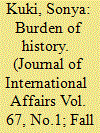

|
|
|
| 2 |
ID:
158912
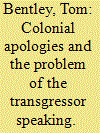

|
|
|
|
|
| Summary/Abstract |
Can state apologies help reconciliation between former coloniser and colonised? Much of the literature on political apologies is optimistic regarding their potential to aid reconciliation. Even critical work frequently dispraises particular case studies, while maintaining a normative commitment to apology. Building on a growing postcolonial literature on the subject, this article contributes a more fundamental critique of colonial apology. It argues that its inherent structure entails a format that accords the politician of the transgressor state an elevated speaking position. This results in the ritual being predisposed to problematic representations of the colonised and sanitised narratives of the transgression. The argument is situated within Edward Said’s considerations on representation in the colonial process.
|
|
|
|
|
|
|
|
|
|
|
|
|
|
|
|
| 3 |
ID:
149642
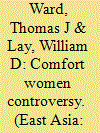

|
|
|
|
|
| Summary/Abstract |
During the World War II, up to 200,000 women, the majority of whom were Korean, were forced to provide sex to Japan’s military forces. The perceived refusal of Japan to fully take responsibility for the mistreatment of these “comfort women” has been a major obstacle to Japanese-Korean relations for a quarter of a century. Although the signing of the December 28, 2015 Agreement between Japan and Korea purported to “finally and irreversibly” solve the comfort women issue that has divided these two East Asian powers, the voices of Korean and Korean-American civil society indicate the contrary. American local, county, and state governments have become key battlegrounds in the conflict. As comfort women memorials across the USA proliferate, these governmental entities have allowed themselves to be caught up in incomplete narratives, whether Japanese or Korean. Against the backdrop of the tense geopolitics of today’s Asia-Pacific, a more responsible, comprehensive inquiry is needed to bring closure to a tragic chapter of human history.
|
|
|
|
|
|
|
|
|
|
|
|
|
|
|
|
| 4 |
ID:
164933
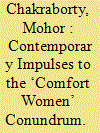

|
|
|
|
|
| Summary/Abstract |
The Second World Warbearstestimony to a gruesome eventrelated to the ‘comfortwomen’ system – which perpetrated organized sexual slavery on non-combatant women – “recruited” from different parts of the Asia-Pacific. The military brothels or “comfort stations” were established, managed and systematically run by the Japanese military, in full cognizance of the Imperial Government, between 1932 and 1945.
|
|
|
|
|
|
|
|
|
|
|
|
|
|
|
|
| 5 |
ID:
138466
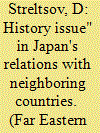

|
|
|
|
|
| Summary/Abstract |
The role and place of certain problems of the past in Japan's relations with neighboring countries including official apologies, "comfort women," and visits by Japanese officials to the Shinto Yasukuni Shrine are examined.
|
|
|
|
|
|
|
|
|
|
|
|
|
|
|
|
| 6 |
ID:
175937
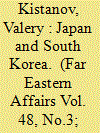

|
|
|
|
|
| Summary/Abstract |
This paper is concerned with the complex problems in relations between Japan and South Korea, rooted in the colonial rule of Japan on the Korean Peninsula. These include the territorial dispute over a group of islets in the Sea of Japan, the issue of Korean "comfort women," Seoul's claim to rename the Sea of Japan as the East Sea, the claim for compensation for Koreans who were mobilized for hard work in Japanese companies during the war, and others. We conclude that growing tensions in ties between Japan and South Korea are weakening the Japan-US-South Korea military-political alliance triangle, which could lead to a change in the balance of power in Northeast Asia.
|
|
|
|
|
|
|
|
|
|
|
|
|
|
|
|
| 7 |
ID:
095331
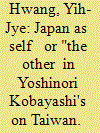

|
|
|
|
|
| Publication |
2010.
|
| Summary/Abstract |
This article is an attempt to demonstrate how and through which social practices Taiwan's past colonial experiences have been discursively produced in a certain way and what other alternatives have been excluded from this process. The article scrutinizes the controversy surrounding a Japanese manga On Taiwan, a book that provides a very positive evaluation of the legacy of Japanese colonialism in Taiwan. Through analyzing statements, utterances, and conducts concerning this manga that were produced by those who have various positions, this article aims to comprehend how the discourses of Japanese colonialism and Sino-chauvinism reciprocally conflict and compete with each other in ways that affect people's self-identification, producing a particular form of subjectivity of Taiwan, while excluding, repressing, and silencing other alternatives.
|
|
|
|
|
|
|
|
|
|
|
|
|
|
|
|
| 8 |
ID:
140287
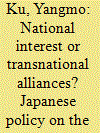

|
|
|
|
|
| Summary/Abstract |
When and why does a perpetrator state take a contrite stance on its past wrongs? More specifically, why do Japanese behaviors differ over time in addressing apology and compensation with regard to the comfort women issue? In this article I address these questions by testing two hypotheses, utilizing an instrumentalist approach and a transnational-political activism model. The former posits a perpetrator state is more likely to take a contrite stance on its past misdeeds when it calculates such action is in its security and/or economic interests. The latter hypothesizes that when transnational activism is powerful and a perpetrator state is led by a progressive ruling coalition, the state is more likely to adopt conciliatory policies toward historical issues. I find that the transnational-political activism model possesses more explanatory power than instrumentalism for within-case variations in Japanese behavior toward the comfort women issue. The two approaches are not, however, mutually exclusive and are complementary in some regards. The effect of transnational activism is heightened when the target state is faced with other geopolitical incentives and/or when the target state is led by a progressive ruling coalition and has weak conservative reaction.
|
|
|
|
|
|
|
|
|
|
|
|
|
|
|
|
| 9 |
ID:
107692
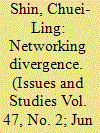

|
|
|
|
|
| Publication |
2011.
|
| Summary/Abstract |
This study challenges the prevailing assumption that a transnational advocacy network (TAN) is a unitary and single actor constituted of participants who share similar beliefs, and presents another aspect of the TAN. It asserts that, on the one hand, a TAN is a network of similarity as it links participants with shared ideas, and on the other hand, it is a network of divergence because of dissimilarities in the actors' characters, interests, or objectives. While the existing literature has examined the development of TANs of similarity, the following key questions remain: how does a TAN deal with the problem of its internal divergence? and conversely how does the diversity problem affect the development of a TAN? To explore the problem of networking with divergence, the study discusses the dimensions of divergence, the impact of divergence, and the management of divergence. It further examines two TAN cases: the "comfort women" TAN and the anti-Yasukuni TAN. It is found that divergence can add pluralism to a TAN if the members' diversity is dealt with positively, with actors complementing each other's roles, although divergence can lead to plurality stagnation when the TAN fails to accommodate divergence efficiently and is caught in conflicts because of the actors' differences. This study asks what affects the decision of a TAN to deal with the problem of divergence and suggests that it depends an whether the divergence involves the risk of unmanageable network cohesion and whether the TAN could afford to live with the network uncertainty that might result flit did not adapt to network divergence. The experiences of the two TAN cases are a valuable reference but they do not provide generalized answers to the question of dealing with divergence.
|
|
|
|
|
|
|
|
|
|
|
|
|
|
|
|
| 10 |
ID:
167167
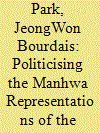

|
|
|
|
|
| Summary/Abstract |
This article discusses the nexus between comics, collective historical memory and politics in the context of the contemporary relationship between Japan and South Korea by examining the graphic manhwa narratives dealing with the memories of comfort women that were exhibited during the Angoulême Comics Festival in France in early 2014. With a theme of ‘memories of war and gendered violence’, commemorating the centennial of the outbreak of the First World War, the event that accommodated a special exhibition for Korean manhwa attracted controversy because of its political nature, drawing heavy media attention and sparking public debate and diplomatic quarrels. Adding academic depth to this cultural and diplomatic clash by linking the concepts of soft power foreign policy and cultural citizenship, this paper investigates what made the cultural event politically tainted and how the politicisation debate between the two countries escalated throughout the event. Existing studies on soft power foreign policy often leave the core contents of the ‘soft’ part unexplained. This article, in contrast, explores the current limits of accommodating cultural expressions of historical memories through an in-depth analysis of the exhibited artworks and the two countries’ nationalised soft power diplomacy. It argues that both governments’ direct and indirect intervention in the cultural realm nurtured irreconcilable cultural representations in this particular theme and genre of cultural representation under the current research.
|
|
|
|
|
|
|
|
|
|
|
|
|
|
|
|
| 11 |
ID:
152075
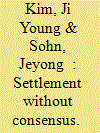

|
|
|
|
|
| Summary/Abstract |
What has shaped contemporary discourse on Japan’s comfort women issue? During the last twenty-five years, civic groups in both Japan and South Korea have made significant efforts to publicize the issue within the international community, hoping to narrow the disparity between the position of the international community and that of the Japanese government. Thus far, however, Japan’s official position has shown little change. Why has international pressure on Japan failed? By focusing on the relationship between international pressure and the formation of Japan’s discourse on the comfort women issue, this paper shows how outside pressure led to a domestic backlash among conservatives in Japan, resulting in the failure to institutionalize apologetic discourse within Japanese society. This study will provide important insights on how democratic countries can sometimes resist strong external pressure to conform to international norms.
|
|
|
|
|
|
|
|
|
|
|
|
|
|
|
|
| 12 |
ID:
173860
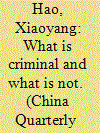

|
|
|
|
|
| Summary/Abstract |
The Chinese Communist Party (CCP) prosecuted Japanese military servicemen for war crimes committed during and after the Sino-Japanese War. This paper examines written confessions left by those Japanese war crimes suspects and considers to what extent they were used by the CCP to prosecute sexual violence during the trials. The historical analysis is contextualized by an examination of the representation of the CCP's legal approach to sexual violence in articles from the People's Daily. This paper finds that although accounts of sexual violence are found in the confessions written by suspected Japanese war criminals, the courts did not make rape a focal point of the prosecutions and did not pursue the so-called “comfort women” issue. Furthermore, no victim of rape was called to testify before the court. The CCP's approach to the issue of sexual violence in the 1956 trials closely corresponded to the discourse and propaganda in the People's Daily.
|
|
|
|
|
|
|
|
|
|
|
|
|
|
|
|
|
|
|
|
|